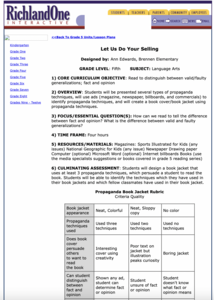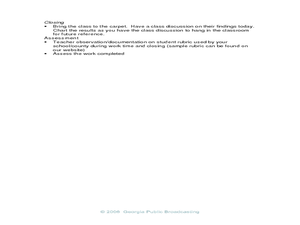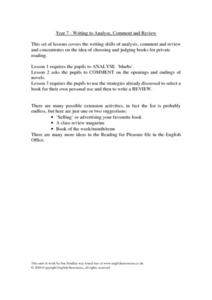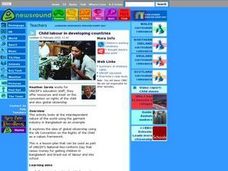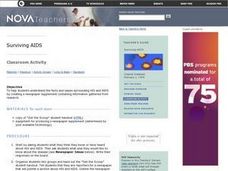EngageNY
Introducing Promises to Keep and Drawing Inferences: Who Is Jackie Robinson and Why Is He Important? (Promises to Keep, Pages 6–7)
Scholars take a picture walk through the book Promises to Keep: How Jackie Robinson Changed America. They make predictions and complete a Notice/Wonder/Inference note catcher. They then define and analyze words on pages six and seven of...
Curated OER
Let Us Do Your Selling
Sixth graders analyze several types of propaganda techniques and create a book cover using the techniques. In this propaganda techniques instructional activity, 6th graders analyze the propaganda techniques used in various ads. Students...
Curated OER
The Vikings
High schoolers research and explore Viking culture, distinguishing between fact and fiction, and examine their contribution to our society.
Curated OER
Thinking Out Loud
Learners share opinions about whether a series of statements from the internet constitute facts or opinions. They read and analyze blogs published in on the web in order to understand the use of fact, opinion, and tone of voice when...
Curated OER
Using Arrays
In this multiplication worksheet, students analyze a grid array and use the grid to show the multiplication fact and answer 6 questions.
Curated OER
Basketball: Number Sense
Third graders explore their addition and subtraction skills. In this number sense instructional activity, 3rd graders analyze different scoring possibilities for a basketball game. This instructional activity incorporates the use a video...
Polk Bros Foundation
Show, Then Write What You Learn
After reading a text or covering a new topic, have class members fill out the four boxes on this page with facts. Individuals can use words or drawings to represent the facts.
Curated OER
Study Skills- Fact and Opinion
Learners engage in a variety of activities in order to achieve the objectives of a layered curriculum unit. They take notes on the differences between fact and opinion. Students also use a newspaper in order to recognize opinionated...
Curated OER
Getting to Know the Candidates: Analyzing Their Campaign Ads
Pupils examine the role of advertising in presidential campaigns. They analyze one candidate's advertising campaign ads for elements such as major issues, positivity, negativity, facts, and opinions.
Curated OER
Pigs: Facts And Fun
Students complete a unit on pigs. They take a field trip to the fair and zoo, watch the video of "Charlotte's Web," create a poster, read and analyze "The Three Little Pigs," write a storybook, participate in a reader's theater, and make...
Curated OER
Multiplication Chart
In this math worksheet, students analyze four multiplication charts. Each chart is illustrated with a different cartoon character.
Curated OER
Inverse and Division
In this inverses worksheet, students analyze 20 basic multiplication facts. Students write the inverse corresponding division problem for each one.
Curated OER
Writing to Analyze, Comment and Review
In this writing to analyze, comment and review worksheet, young scholars analyze blurbs, comment on the openings and endings of novels, and review a book from their own choosing. Students answer seventy short answer questions.
Prestwick House
Understanding Language: Slant, Spin, and Bias in the News
We live in a time of fake news, alternative realities, and media bias. What could be more timely than an activity that asks class members to research how different sources report the same topic in the news?
Curated OER
Amazing Birds!
For this science/bird worksheet, students research, analyze and illustrate how to categorize birds, list facts about birds, and draw a picture of a bird.
Curated OER
Child Labour in developing countries
Young scholars explore the idea of global citizenship. Students examine the UN Convention on the Rights of the Child worldwide. Young scholars analyze facts about UNICEF's National Non-Uniform Day.
Curated OER
Analyzing the S-I-R Model
In this SIR model worksheet, students analyze a real life problem using the SIR method. They explore given facts and determine the threshold value for an epidemic, the sequence for the recovery period, and the effect on the model from a...
West Virginia Department of Education
Intelligence of Authentic Character - News Coverage and John Brown's Raid
The resource, a standalone, shows how news coverage of John Brown's Raid began when the event happened and how that reporting shaped perception in West Virginia history. The resource includes interesting anticipatory discussion...
Advocates for Human Rights
Nativism and Myths about Immigrants
Where do anti-immigrants myths come from, and how can they be refuted? Learners critically analyze media reports and how to identify reliable sources. After studying a timeline that details the history of US nativism, groups research the...
National Endowment for the Humanities
The Argument of the Declaration of Independence
When in the course of a course on historic American events, it becomes necessary for learners to examine, with decent respect, the Declaration of Independence, it becomes evident that there are six separate and equal parts of that...
Curated OER
Surviving AIDS
Enhance your middle and high schoolers' research skills with this instructional activity. After viewing a video clip about HIV and AIDS, high schoolers identify the facts and issues surrounding the disease. They work together to create a...
Curated OER
Who's The Boss?
Upper elementary and middle schoolers research and analyze some different types of governments. Democracies, Monarchies, and Dictatorships are some of the types that are looked at. Learners use the Internet to gather information that...
Curated OER
The Chesapeake Bay in Captain John Smith's Time
When Captain John Smith visited the Chesapeake Bay in the summer of 1608, what types of animals and habitats did he encounter? Your young historians will analyze primary source documents to answer this question, as well as compare the...
Curated OER
"Croak" Science Mystery
Solve the mystery of a declining frog population! Lead your junior ecologists on an investigation that simulates actual events concerning pollution, predation, poaching, and more. Investigators read a story online, then analyze survey...



